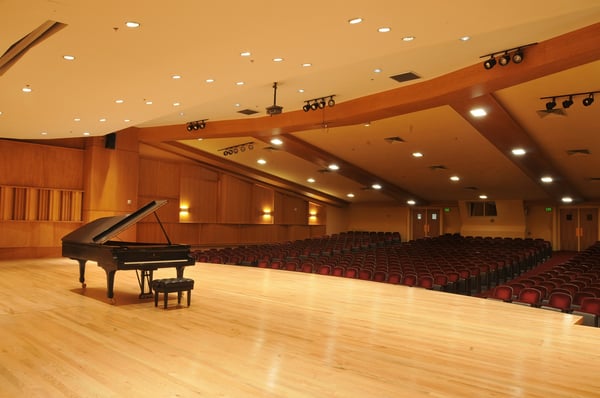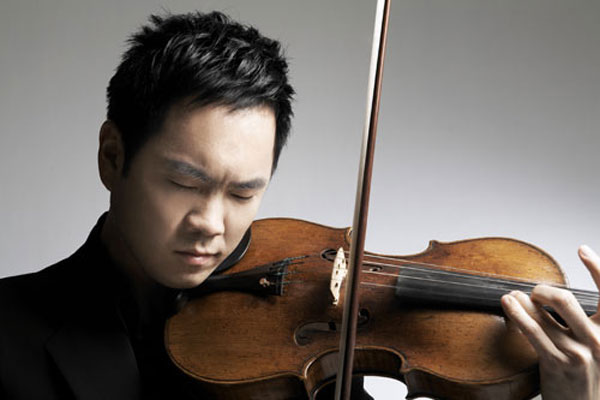Next Tuesday’s program offers works by Karol Szymanowski, György Kurtág and Fauré.
By Izzy Fincher Oct. 22 at 5:20 p.m.
CU-Boulder’s Grusin Hall is usually packed on Tuesday nights. Clusters of people gather, chatting and laughing, filling the hall with a pre-concert energy.
They are here for Faculty Tuesdays, a free concert series featuring CU faculty, which runs from September to March.

Now on Tuesday nights, Grusin Hall sits mostly empty. But the Faculty Tuesdays series continues through livestreaming. Without an in-person audience, only the performers, a stagehand and the crew of audio technicians remain.
“At CU, we have this wonderful community of people who come to Faculty Tuesdays,” Alejandro Cremaschi, professor of piano pedagogy, says. “I hope that they feel like we are back together after not having live performances for a while. It’s not perfect, but it’s better than not having anything.”
Cremaschi performed for the first Faculty Tuesdays concert on Sept. 1 with pianist Jéssica Pacheco. Their program featured female composers from the Americas.
Performing safely under social distancing protocols required flexibility. Pacheco and Cremaschi had to play four-hand works on two separate pianos, a challenging experience with fewer visual cues. For the livestream, with up-close cameras and mics rather than a distant live audience, Cremaschi had to tone down his loud announcement voice.
“I am used to speaking from the stage with a voice that projects,” Cremaschi says. “With the microphone, I was yelling so loud that the recording technicians changed the microphone to something that was less live.”
Yet, for Cremaschi, who hadn’t performed live since March at the time, his Faculty Tuesdays livestream was exciting.
“Even though we didn’t have an audience, we play differently when we are doing it for real,” Cremaschi says. “Jéssica loves being on stage, and I love that too. We sound better when we are playing for real. It was nice to have that feeling and energy coming from her. If I had been playing by myself, that would have been really hard.”
Pianist David Korevaar is also excited for his upcoming Faculty Tuesdays livestream. He will perform on the Oct. 27 concert, “Signs, Games + Messages,” which will feature works by Karol Szymanowski, György Kurtág and Fauré.
The performance of “Signs, Games + Messages” has been postponed for years. In 2016, Korevaar, David Requiro, Harumi Rhodes and Geraldine Walther, former violist of the Takács Quartet, planned to play this program for Faculty Tuesdays, but that concert fell through.
Now in 2020, the concert will finally happen with three original collaborators, Korevaar, Requiro and Rhodes, plus Richard O’Neill, the Takács Quartet’s new violist in place of Walther. Korevaar calls it “long postponed, joyful music-making.”
Korevaar will play on two of the three pieces: Szymanowski’s Mythes, op. 30, and Fauré’s Piano Quartet No. 2 in G minor, op. 45. Mythes is a virtuosic duet for violin and piano, filled with symbolism, extended tonalities and rich harmonies.
While isolated in Poland during World War I, Szymanowski turned to ancient Greek culture and drama for inspiration. Composed in 1915, Mythes shows this influence in the three movements: “I. La Fontaine d’Aréthuse,” “II. Narcisse” and “III. Dryades et Pan.”
“It’s an extraordinarily beautiful piece that isn’t done a lot in public because it is also extraordinarily difficult,” Korevaar says. “It’s a scary score to read, but it’s fun to play with a great musician. I am having a wonderful time.”
Korevaar also looks forward to Fauré’s Piano Quartet No. 2. The quartet, premiered in 1887, is a somber, complex work, marking a departure from Fauré’s First Piano Quartet, which was pleasantly simple and conventional. Cyclical themes, filled with rhythmic and melodic development, build and return throughout the later work. Aaron Copland described it as “mature work [that] shows the composer less carefree, less happy, more serious, more profound.”
For Korevaar, the rehearsal process has been largely the same as pre-COVID-19, though with increased distance between players. Masks are a bit more of a challenge—without facial expression cues, the musicians must rely on each other’s movements and gestures.
“(In chamber music,) we do a lot with eyes, with body motions, with the sense of breathing, which doesn’t mean we have to see the breathing apparatus,” Korevaar says. “It’s a whole-body thing.”
This will be Korevaar’s third livestream this fall, after a solo livestream and a duo livestream with violinist Charles Wetherbee in mid-October. He is still getting used to the experience. He says he feels more self-critical in front of cameras and misses the live audience’s energy. However, he finds the energy from other musicians makes the livestream more comfortable, and he looks forward to next Tuesday’s performance.
“It’s a new adventure,” Korevaar says. “In a livestream, you don’t have the opportunity to fix stuff, but you get the same self-consciousness about the bloopers. With chamber music, it’s easier because there is mutual energy, and everybody is working together.”
# # # # #
Signs, Games + Messages
Harumi Rhodes, violin, Richard O’Neill, viola, David Requiro, cello, and David Korevaar, piano
Streamed from CU-Boulder’s Grusin Hall
Karol Szymanowski: Mythes, Op. 30
György Kurtág: Signs, Games and Messages
Fauré: Piano Quartet No. 2 in G minor, Op. 45
7:30 p.m. on Tuesday, Oct. 27, on CU Presents
__________________
See all remaining Faculty Tuesday performances here.




